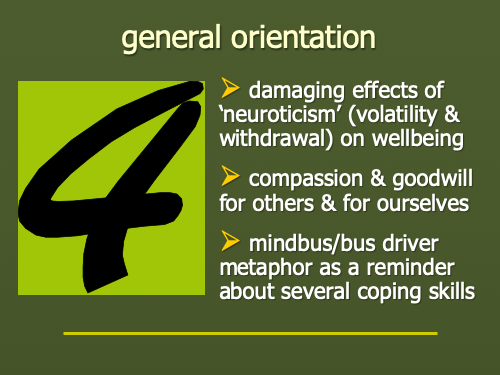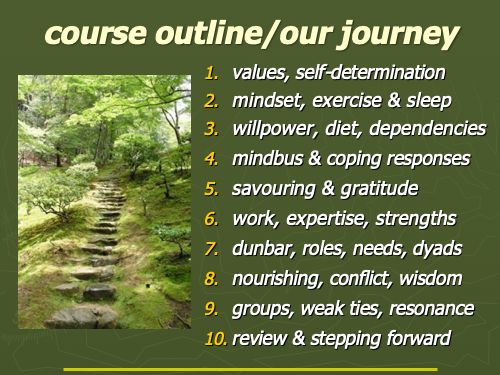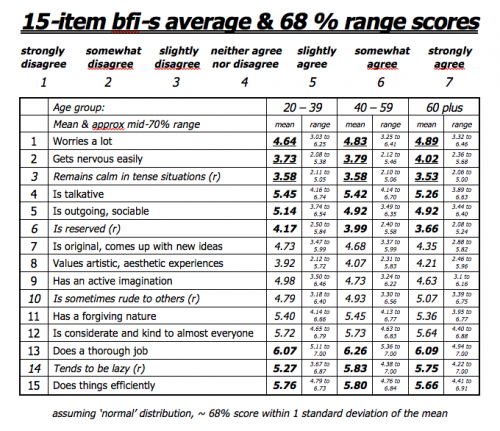How to live well: 4th meeting - coping with difficulties, the mindbus, compassion, mindfulness & reappraisal
Last updated on 22nd May 2019
"You learn to love by loving - by paying attention and doing what one thereby discovers has to be done." Aldous Huxley
"I expect to pass through life but once. If therefore, there be any kindness I can show, or any good thing I can do to any fellow being, let me do it now, and not defer or neglect it, as I shall not pass this way again." William Penn
These are notes on the fourth evening of the ten-session "How to live well - a shared exploration" training. Information about the third meeting can be found at "How to live well: 3rd meeting - willpower, wooping, diet & dependencies".
key points of the fourth meeting: At this fourth session we looked particularly at dealing with 'negativity' and also explored the overlapping areas of compassion for ourselves & for others. The 'Mindbus Metaphor' was introduced with its various important components - the Bus Driver's Values & Goals focus, using Mindfulness to cope with the difficult Passengers of Catastrophising, Self-Blame & Worry/Rumination, the friendly Bus Conductor's kind Self-Compassionate Hat & reappraising Wise Hat, and the Coffee Stops' opportunities for emotional processing. Here's a link to the slides that we used at this meeting. As you can see, these include a brief review of points we covered at the third session and introduction of three new areas at this fourth session - dealing with 'negativity/neuroticism', compassion for self & others, and the 'mindbus metaphor'.
As an aside, I have some problems with terms like negativity & positivity or negative & positive emotions ... and I'm even cautious about an over sugary use of the term positive psychology. It can seem a bit pedantic, but typically the adjectives adaptive & maladaptive are more useful than negative & positive when referring to emotions. By this I mean that pretty much any emotion can at times be adaptive and help us respond more effectively to our situation, and pretty much any emotion can at times be maladaptive and nudge us to respond more ineffectively to our situation. When the terms negative & positive emotion are used, they usually refer to whether or not the emotions feel pleasant or unpleasant. In the end it's considerably better to have an unpleasant, adaptive emotion than a pleasant, maladaptive one (although adaptive, pleasant emotions are particularly welcome)! So when I write, in the paragraph above on key points of the fourth meeting, that this evening's session looked particularly at dealing with 'negativity', I'm referring here to unpleasant, maladaptive emotions & thinking patterns like catastrophising, self-blame & worry/rumination. For more on this, and suggestions on when one might helpfully 'listen to the bus passengers', see the post "The 'bus driver' is warm-blooded: integrating mindfulness & emotion".
And here are the three key points we focused on at this meeting:

Within the broader context of the overall course:

the damaging effects of neuroticism (volatility & withdrawal) on wellbeing: In the important 2017 paper by Headey & Muffels - "A theory of life satisfaction dynamics: stability, change and volatility in 25-year life trajectories in Germany" - the authors write that for life satisfaction "it is proposed that stability is primarily due to stable personality traits, and also to parental influence" . Gosh, that's a big claim for the importance of personality for wellbeing ... and it's well-evidenced. Ono et al's paper "The influence of parental care and overprotection, neuroticism and adult stressful life events on depressive symptoms in the general adult population" found that "Low care and high overprotection of the PBI (Parental Bond Inventory - downloadable from near the bottom of this Good Knowledge page) increased depressive symptoms and negative change scores on the LES (Life Experiences Survey) through enhanced neuroticism". A further paper from last year - "The influence of major life events and personality traits on the stability of affective well-being" - found that wellbeing was affected twice as much by personality as by life events (although they interact), with emotional stability (neuroticism) followed by extraversion having the highest effects.
Review your scores on the 15-item big 5 personality inventory (bfi-s). Remember that to optimise wellbeing we probably particularly need to reduce any tendency to high neuroticism/emotional instability. In the descriptive statistics table below the 15-item questionnaire itself, we're interested in the 'self' column (indicating the questionnaire was self-completed) relevant to our age group. Young Adults refers to 20 - 39 year olds, Middle-Aged to 40 to 59, and Older Adults to 60 plus. The M column gives mean (average) scores for each question, and the SD column gives the standard deviation. Assuming a normal distribution of scores, which is probably largely correct, then about 68% will score in the range running from a standard deviation below the mean score to a standard deviation above. The table below gives average/mean values for each question across the three age groups surveyed. You probably won't be able to read the small script of the range. Here are the relevant values as a downloadable document.

So for high wellbeing, we do well to score low on neuroticism as assessed in the first 3 questions. Higher scores on extraversion (assessed with questions 4 to 6), and on conscientiousness (assessed with questions 13 to 15) also tend to link to greater wellbeing. Agreeableness (questions 10 to 12) is interesting. If agreeable behaviours are heavily driven by wanting people to like us, then higher agreeableness if anything seems to be associated with more psychological problems. If however it's driven more by a genuine, autonomous wish to live with warmth & kindness, then high agreeableness does seem to be associated with greater wellbeing. Openness to experience (questions 7 to 9) is not clearly linked to wellbeing one way or the other (in these research findings).
Please check how you've scored on the BFI-S, and consider how you could decrease your scores for neuroticism, and increase for extraversion & conscientiousness. Do have a look at the abstracts on the second side of the BFI-S download. Become expert on the various coping responses highlighted in the mindbus/bus driver metaphor. Note too the findings from Headey & Muffels 2017 paper"A theory of life satisfaction dynamics: stability, change and volatility in 25-year life trajectories in Germany" with its abstract reading "An adequate theory of life satisfaction (LS) needs to take account of both factors that tend to stabilise LS and those that change it ... In this paper we set out a preliminary revised theory, based mainly on analysis of the LS trajectories of the 2473 respondents in the German Socio-Economic Panel who reported their LS for 25 consecutive years in 1990–2014. The theory entails three sets of propositions in which we attempt to account for stability, change and also volatility. First, it is proposed that stability is primarily due to stable personality traits, and also to parental influence on LS. The second set of propositions indicates that medium and long term changes are due to differences and changes in personal values/life priorities and behavioural choices. Differences in the priority given to pro-social values, family values and materialistic values affect LS, as do behavioural choices relating to one’s partner, physical exercise, social participation and networks, church attendance, and the balance between work and leisure. Medium term change is reinforced by two-way causation—positive feedback loops—between values, behavioural choices and LS. The third set of propositions breaks new ground in seeking to explain inter-individual differences in the volatility/variability of LS over time; why some individuals display high volatility and others low, even though their mean level of LS may change little over 25 years". Remember too the Roberts et al meta-analysis on the encouraging effects of therapy on personality.
More to follow ...
Here are the "Home practice" requests for this fourth week:
1.) The new Self-compassion second 4-breath section of the 12-breath practice involves soothing touch & reassuring use of one's own name. Here's a link to a 10-minute exploration of what Kinds of soothing touch work best for you. Listen through this recording once or twice to assess what feels most calming & settling. Then experiment with using this touch at the 5th breath of the 12-breath practice. Sometimes I will use soothing touch just for one breath, sometimes I'll continue to use it during the next 3 breaths of the deliberately settling and/or energising second body scan (breaths 6 to 8 of the practice). Here's another recording that takes you through the full fourth week's 12-breath mini-meditation practice. See 2.) below for how the last 4-breath section of the practice now moves into Compassion for others.
2.) From the first week of this training, we have underlined the importance of living Values of Spine & Heart for our own wellbeing and also for the wellbeing of others. The 9th breath of this week's 12-breath practice is used to remind ourselves of Spine & Heart or whatever words we personally find best nourish these qualities in ourselves. We now have a choice about the last three breaths of the practice. If the next few hours (until the next 12-breath practice) mainly involve working to get things done then we typically use the familiar 3-breath WOOP (Wish-Outcome-Obstacle-Plan). However, if the next few hours particularly involve interacting with others, then we can use the last 3 breaths for a Goodwill/Loving-Kindness/Compassion practice. This typically involves imagining the people involved, breathing goodwill to them, and possibly too using some simple form of words that underlines this compassionate intention. Traditionally one chooses a simple phrase to wish physical wellbeing for the person you’re focusing on in the practice, another simple phrase to wish them well emotionally, and a third phrase to wish them well for their life generally. Examples are “May this person (refer to them by name if this feels easier) be well. May they be happy. May they flourish” or “May this person be free from suffering. May they live joyfully. May they fulfil their dreams”, and so on. Think about what words or phrases you’d like to use before you start the first goodwill exercise. Once you’ve come up with a set of words that feels right for you, don’t chop and change too much. Try to stick with the phrases for a few practices to give yourself a chance to see what helps you and what doesn’t. It’s been said “Hold the phrases lightly and care-fully like carrying quite fragile, precious china”! As always, find out what works best for you. In this week's handout you also have a 'Finding loving kindness phrases' download from the Informal MSC practices section of Chris Germer's excellent Mindful self-compassion website. This approach can also inform phrases you might use when focusing on compassion for others. Aim to make time for three practices daily, with one of them being a bit longer - see 3.) below.
3.) Try once a day to make the meditation practice a little longer - approximately 6 minutes for a twice-through or approximately 9 minutes for a thrice-through practice. If you would like to increase the challenge in this training a little further, then start to notice if your mind wanders significantly & restart the practice section you're on if this happens. So the first section of the practice involves a three-breath body scan and a one-breath naming. The second section involves a one-breath soothing touch and a three-breath body relaxation/energising. And the last section involves a one-breath connection to values and three-breaths either WOOPing or channelling goodwill. As we run through these three four-breaths sections of the practice, at least three types of focus may occur. One possibility is that we will maintain clear attention on the four-breath sequence with hardly any other mental content appearing in our minds. It's very usual however for this not to be the case. At the other extreme of focus quality, we start to go through the four breaths but we become completely distracted. So for some moments our minds are off on some other mix of thoughts, memories, images, and so on. If this happens, one training response is simply to go back to the beginning of the four breath sequence & start again. If it happens again, start again ... and so on. It's like going to the gym to give our attentional processes some exercise - we know we are literally growing sections of our brains (like strengthening a muscle). Obviously you need to limit how long you give to this somewhat longer meditation (for example 10, 15 or 20 minutes). With the mind wandering a good deal, even a simple twice-through intention can take quite a lot longer if we're returning to the start of each four breath section every time our minds wander significantly. The third type of focus, you may experience, is between clear maintained attention and complete distraction. In this intermediate level of focus, other thoughts/images/memories/etc run through our minds, but as a backdrop to our continued attention to the breath sequence. This is fine. Don't go back to the start of the section if only this back-stage mental activity is going on at the same time as the front-stage breath focus.
4.) Much as we did during the first two weeks of the course, please would you again use quotations and writing ... this time to deepen our link to the importance of Compassion/Goodwill/Loving-Kindess. These words overlap in their meaning. Quite often Compassion particularly refers to kindness in response to another person's (or our own) suffering, while Goodwill or Loving-Kindness are often used more broadly to describe kindness & well-wishing for others even when they're fine and having a good time in their lives. Interestingly it's sometimes more of a challenge to wish people well when they're flourishing than it is to wish them well when they're suffering! Look through the 'Using physical reminders to wake up (Heart)' sheet. Either choose one of these quotations, that particularly moves you, to write out & carry with you over the week ... or choose a favourite quotation on this Loving-kindness theme that you already know & love. And also please take about 10 minutes to do this writing exercise on Compassion/Goodwill/Loving-Kindess. Don't be fooled by the simplicity of this latter exercise. Writing like this can produce benefits in wellbeing & functioning that echo on in our lives for two or three weeks (see research detailed on the back of the writing exercise handout).
5.) Personality ... in the sense of long term patterns of relating to ourselves, others & the world ... has a major effect on health, functioning & wellbeing. See the paragraph higher up the page on reviewing one's score on the 15-item big 5 personality inventory (bfi-s).
6.) In many ways the dealing with 'negativity' emphasis on this fourth meeting of the course is very much about building emotional intelligence. A simple daily 6-minute exercise that helps us better notice, identify & differentiate what we're feeling can have multiple benefits - see the post "The 'emotion colouring in exercise': how to do it" for more on this.
7.) And a further excellent key way of coping better with maladaptive 'negativity' is via reappraisal - see "Reappraisal training can help hugely in coping with difficult experiences" and "Reappraising reappraisal".
8.) And try to keep momentum on the Four fundamentals of Exercise, Diet, Sleep & Dependencies.
9.) Finally, please glance back over the 12-page handout you were given at this fourth meeting and on the last page "Week four reflection sheet", jot down how you found the evening ... especially what felt most interesting or important or useful for you.
Remember we're all in different life situations as well as having differing abilities to make changes. Set yourself a level of challenge in the Home practices that is stretching but not unrealistic. If we don't get out of our comfort zones, it's unlikely we'll benefit much from this course ... but at the same time, if we set ourselves unrealistic goals we'll stretch ourselves too much. Then see the notes for the next session - "How to live well: 5th meeting - positivity, savouring & gratitude".
